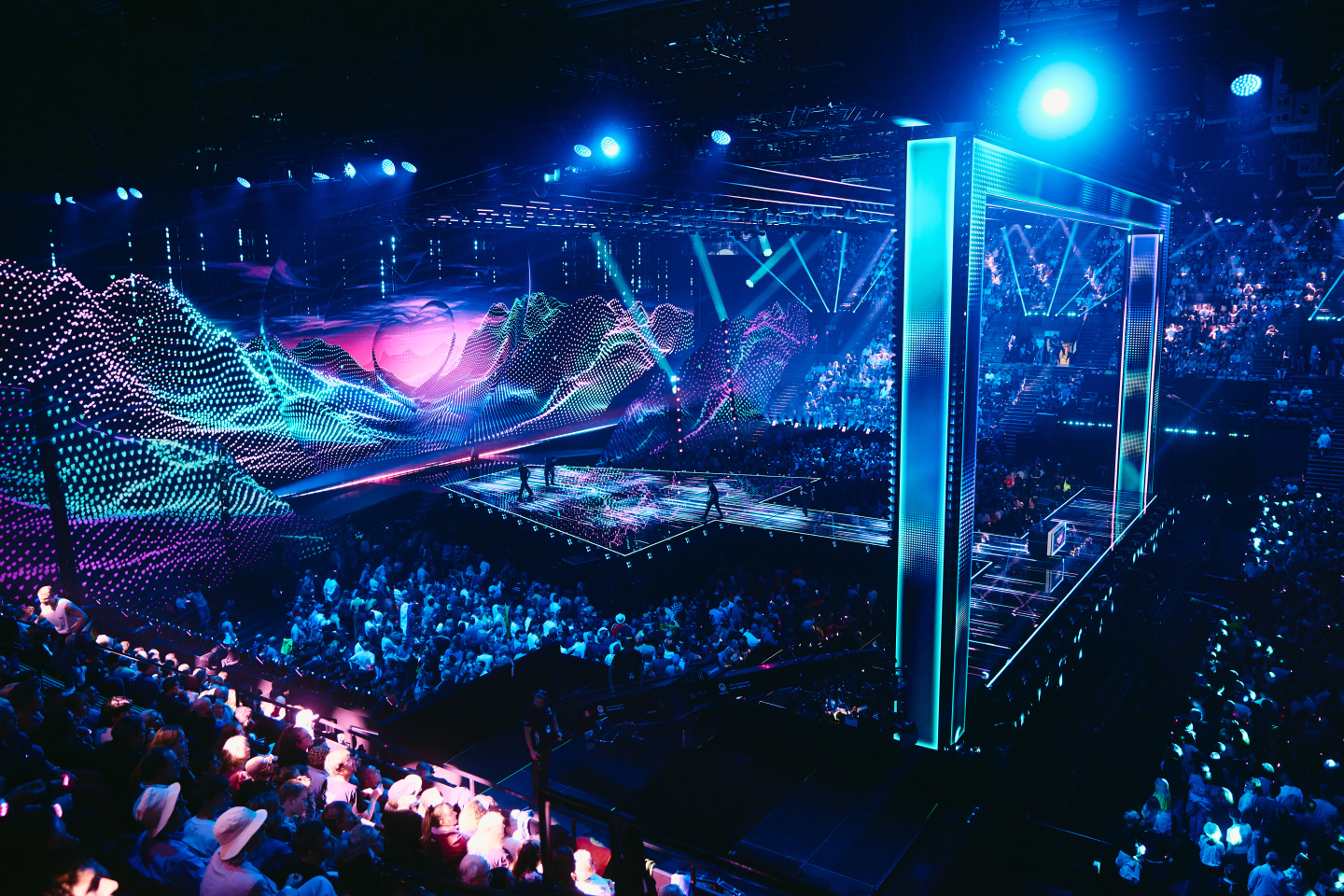The Eurovision Song Contest has cemented its status as a global cultural phenomenon, with the 2025 edition drawing unprecedented viewing figures, digital engagement and musical success.
Hosted in Basel, Switzerland, the 69th Eurovision Song Contest reached a total TV audience of 166 million viewers across 37 participating broadcasters—three million more than in 2024. Swiss broadcaster SRG SSR staged the event across three live shows on 13, 15 and 17 May, delivering more than nine hours of live television watched around the world.
Television Ratings Soar
This year’s Grand Final achieved a viewing share of 47.7% across measured markets—the highest since 2004 and more than double the average share of the channels that aired it (19.9%).
Among younger audiences aged 15–24, the appeal was even stronger, with a record 60.4% viewing share—nearly four times the average.
Nineteen of the 37 participating countries recorded Grand Final viewing shares above 50%, led by:
• Iceland: 97.8%
• Finland: 90.5%
• Sweden: 89.6%
• Norway: 85.4%
• Denmark: 75.1%
Notable figures were also seen in the Netherlands (75.1%) and German-speaking Switzerland (74.2%). In the host country, an average of 1.1 million viewers tuned in—up 57% on 2024, setting records in all linguistic regions.
Other standout performances included:
• Germany: 9.1 million viewers – highest since 2016
• Poland: 4 million viewers – triple the 2024 audience
• France: 40% viewing share – all-time high
• Greece: 2.8 million viewers, 70.8% share – best since 2010
Online and Global Reach
Eurovision’s digital platforms continued their exponential growth. The Grand Final attracted 12.1 million YouTube views in the seven days following the broadcast—up 8% on Malmö 2024. Peak live concurrent viewership reached 1.58 million.
The two Semi-Finals also performed strongly online, recording 4.4 million and 3.4 million YouTube views respectively in their first week.
Across the wider Contest period (3–24 May), total views on Eurovision’s YouTube channel hit 369.5 million—a 9.3% year-on-year increase. Audiences came from 232 countries and territories, with 60.7 million unique viewers.
A new 24/7 music livestream, Eurovision Non-Stop Hits, attracted over 5.1 million views and generated 708,727 hours of watch time between 1 and 27 May, peaking with more than 108,000 concurrent viewers after the Grand Final.
Voting From Around the World
Viewers from 146 countries and territories cast votes during this year’s Contest. As in previous years, votes from non-participating countries were combined and treated as a single “Rest of the World” jury.
The highest voting activity outside Europe came from the United States, Canada, Romania, Slovakia, Mexico, Türkiye, Hungary, Kosovo, the United Arab Emirates, and South Africa.
Social Media Surge
The Contest’s digital presence has continued its year-round momentum, particularly among younger fans.
TikTok (Jan–24 May 2025):
• 748.5 million video views (+3%)
• 48.9 million likes (+17%)
• 2.76 million shares (+84%)
• 5 million comments (+79%)
• 42.4% of followers are aged 18–24
Instagram:
• 969 million total views
• 69.6 million accounts reached
• 30.6 million interactions — double 2024 levels
• Primary audience: 18–34 year-olds
Facebook:
• 161 million views
• 29.9 million accounts reached (+30.9%)
• 2.8 million interactions (+98%)
• Key demographics: 25–44 year-olds
Elsewhere:
• Eurovision’s official WhatsApp group attracted 102,000 followers
• The Reddit subreddit grew from 250,000 to 340,000 members
• The Eurovision Podcast recorded 1.5 million plays across platforms (+25%)
The Eurovision app was used by 1.8 million people in May, including 1.1 million on Grand Final day. App engagement rose 10% compared to last year. Meanwhile, Eurovision.tv saw 17 million page views and 5.4 million active users in May.
Roblox Experience Engages New Audiences
A collaboration between the EBU and nine European broadcasters brought the “My Eurovision Party” experience to the Roblox platform, attracting 1.2 million visits from 183 countries between 25 April and 27 May. The average player spent 11.5 minutes in the experience, with 23,000 people online during the Grand Final.
Host City Basel Welcomes Half a Million Visitors
Early figures suggest more than 500,000 people took part in Eurovision-related events in Basel during the week of the Contest.
• Opening Ceremony: 100,000+ attendees
• Live shows and watch parties: ~100,000 attendees
• City venues: 343,000 total visitors
• Eurovision Village: 190,000
• Eurovision Square: 135,000
• EuroClub: 18,000
Hotels saw 95% occupancy toward the end of Eurovision week, generating over 50,000 room nights—a substantial increase on the city’s typical May average.
A total of 100,000 tickets were sold for nine shows, including rehearsals, live broadcasts and a major Grand Final viewing party at St. Jakob’s Park football stadium. Around 1,000 journalists from more than 50 countries were accredited to cover the event onsite.
A Global Celebration
Martin Green CBE, Director of the Eurovision Song Contest, said:
This year’s Eurovision Song Contest has once again demonstrated its extraordinary power to unite millions across continents through the joy of music and shared celebration.
In a fragmented media landscape, the ESC stands out as a unique global moment – bringing viewers back to live television, while simultaneously thriving across digital platforms and reaching new generations in new ways.
The Contest’s growing musical impact is undeniable, with songs resonating on global streaming charts and inspiring fans worldwide. From living rooms to livestreams, and from national pride to international connection, the Eurovision Song Contest continues to be one of the most vibrant and unifying cultural experiences on the planet.
Co-Executive Producers for SRG SSR, Reto Peritz and Moritz Stadler, added:
We are truly delighted that the Eurovision Song Contest 2025 was such a great success – in the Host City of Basel, on screens across the world and throughout social media. The excitement and positive energy could be felt everywhere. This ESC brought people together – and took the world’s biggest music event to a whole new level.
The Eurovision Song Contest 2025 was coordinated by the European Broadcasting Union and broadcast in 37 participating countries, along with North Macedonia, Kosovo, Moldova, the United States, and globally online. Fifteen EBU members also aired the shows on radio.

